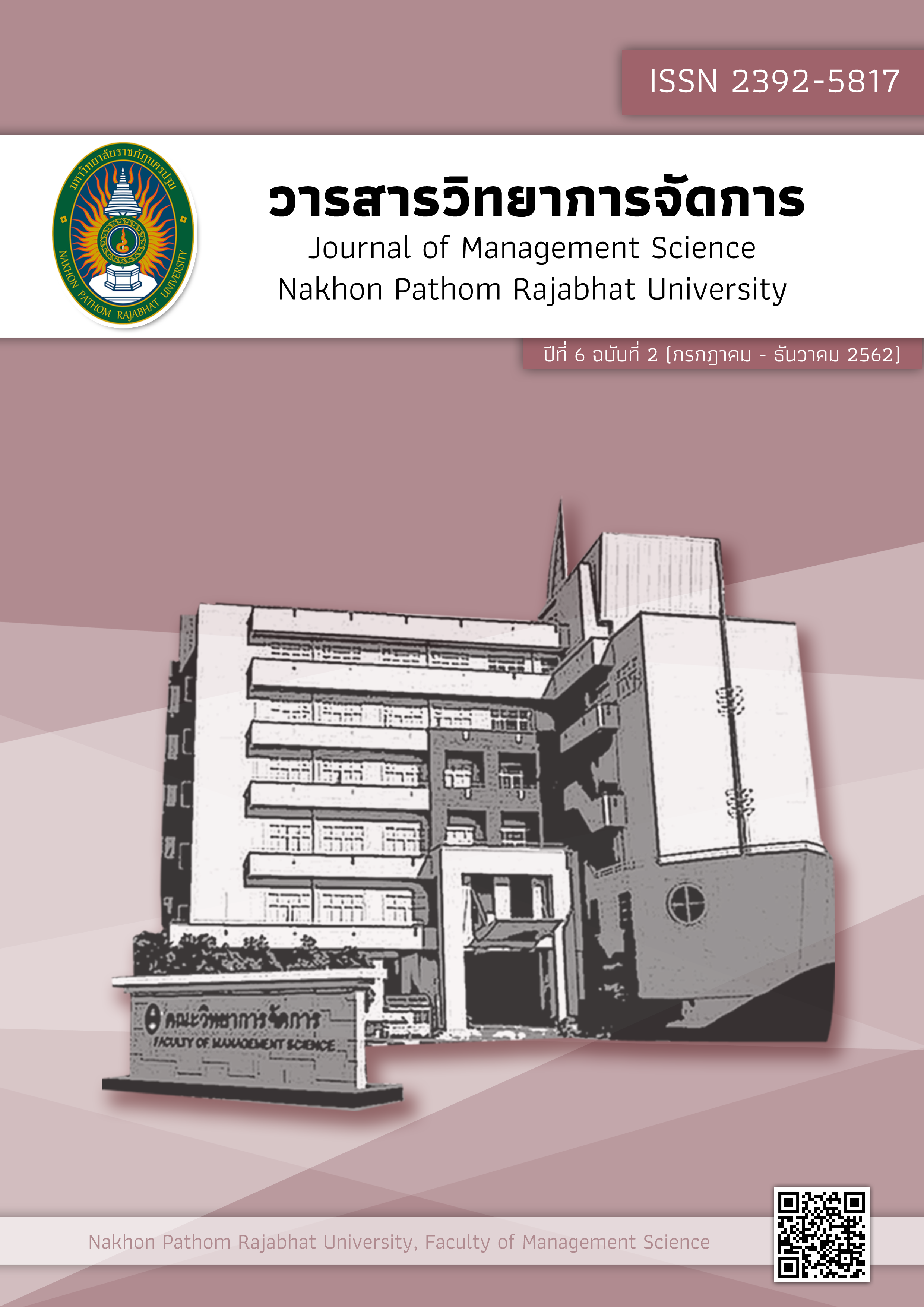Motivation and Organizational Climate Associating with Employee Performance: A Case of Sony Technology (Thailand) Co., Ltd.
Main Article Content
Abstract
This study aimed to study 1) employees’ motivation level at Sony Technology (Thailand) Co., Ltd., according to Alderfer's ERG motivation theory; 2) Organizational climate of Sony Technology (Thailand) Co., Ltd.; 3) employee performance level of Sony Technology (Thailand) Co., Ltd.; and 4) association of motivation and organization climate with employee performance. The samples used in this research were of 390 employees of Sony Technology (Thailand) Co., Ltd. Questionnaires were used a research tool. The study found that employees’ motivation in terms of existence needs had positive association with employee performance in terms of quantity (r = 0.527). This was followed by employees’ motivation in terms of growth needs associating with employee performance in terms of time (r = 0.518). Herein, independent variables in all dimensions were moderately associated with dependent variables. In addition, organizational climate in terms of organizational commitment associated with employee performance in terms of quantity (r= 0.540). This was followed by organizational climate in terms of organizational commitment associating with employee performance in terms of time (r = 0.536). The independent variables were moderately associated with dependent variables
Article history : Received 10 January 2019
Revised 10 February 2019
Accepted 14 February 2019
SIMILARITY INDEX = 0.00
Article Details
The views and opinions of the article appearing in this journal are those of the author. It is not considered a view and responsibility of the editorial staff.
References
กรุงเทพธุรกิจ. (2561). อิเล็กฯชี้แนวโน้มปีนี้สดใสต่อเนื่อง. [ออนไลน์]. ค้นเมื่อ 3 มกราคม 2561 จาก https://www.bangkokbiznews.com/news/detail/787225
กฤษดา เชียรวัฒนสุข. (2561). หลักการจัดการและองค์การ. กรุงเทพฯ: ทริปเฟิ้ล เอ็ดดูเคชั่น.
กฤษดา เชียรวัฒนสุข รัชนี แก้วมณี นีรนุช สายสุยา และ สุภัสสรา กิริกา. (2561). แรงจูงใจที่มีอิทธิพลต่อผลการปฏิบัติงานของพนักงาน กรณีศึกษา บริษัท อายิโนะโมะโต๊ะ เบทาโกรสเปเชียลตี้ฟู้ดส์ จำกัด. วารสารการตลาดและการจัดการ, 5(2), 55-69.
กฤษดา เชียรวัฒนสุข ณัฐนันท์ สุทธาระชีวศาสตร์ วราภรณ์ คำสน ทาริกา จันทร์จำนงค์ กมลมาตุ กุลมณี กนกวรรณ สว่างเนตร อานนท์ ทรัพย์มั่น และ ชุติมา ปิ่นทอง. (2560). แรงจูงใจที่มีอิทธิพลต่อผลการปฏิบัติงานของพนักงาน กรณีศึกษา บริษัท ทีโอที จำกัด (มหาชน) สำนักงานใหญ่แจ้งวัฒนะ. วารสารวิจัยมหาวิทยาลัยเวสเทิร์น มนุษยศาสตร์และสังคมศาสตร์. 3(2) 29-43.
ชุลีพร เพ็ชรศรี. (2556). คุณลักษณะของผู้ตามและบรรยากาศองค์กรที่มีอิทธิพลต่อประสิทธิภาพการปฏิบัติงาน ของพนักงาน. วิทยานิพนธ์ปริญญาบริหารธุรกิจมหาบัณฑิต, มหาวิทยาลัยเทคโนโลยีราชมงคลธัญบุรี.
ทิพาวดี เมฆสวรรค์. (2538). การส่งเสริมประสิทธิภาพในระบบราชการ. กรุงเทพฯ: สำนักพิมพ์ ก.พ.
นาถรพี ชัยมงคล กฤษดา เชียรวัฒนสุข ชุติมาภรณ์ ใจวงษ์ กมลชนก ธนะสีรังกูล และ ศศิวรรณ ชมเจริญ. (2561). อิทธิพลของพฤติกรรมการเป็นสมาชิกที่ดีและประสิทธิภาพของทีมงานที่มีผลต่อผลการปฏิบัติงานของพนักงาน. วารสารวิทยาการจัดกา มหาวิทยาลัยราชภัฏนครปฐม. 5(1) 173-186.
ปุณณภา อมรปิยะกิจ. (2552). แรงจูงใจที่มีผลให้พนักงานเกิดความผูกพันต่อองค์กร: กรณีศึกษาศูนย์เทคโนโลยีอิเล็กทรอนิคส์และคอมพิวเตอร์แห่งชาติ. วิทยานิพนธ์ ครุศาสตรมหาบัณฑิต, สาขาวิชาการบริหารการศึกษา, มหาวิทยาลัยเทคโนโลยีราชมงคลธัญบุรี.
พิเชษฐ์ ศรีไชยวาน. (2554). แรงจูงใจในการปฏิบัติงานของบุคลากรองค์การบริหารส่วนตำบลในเขตพื้นที่อำเภอศรีสมเด็จ จังหวัดร้อยเอ็ด. สารนิพนธ์ ปริญญารัฐประศาสนศาสตรมหาบัณฑิต, สาขาวิชาการบริหารงานท้องถิ่น, ชัยภูมิ: มหาวิทยาลัยราชภัฏชัยภูมิ..
วลี ตั้งสวัสดิ์ตระกูล. (2541). ปัจจัยที่มีอิทธิพลต่อความพึงพอใจในการปฏิบัติงานของวิศวกรในบริษัทเอกชน. วิทยานิพนธ์ศึกษาศาสตรมหาบัณฑิต, มหาวิทยาลัยรามคําแหง.
สายงานวิชาการ สภาอุตสาหกรรมแห่งประเทศไทย. (2560). Industrial review: ภาวะอุตสาหกรรมประจําเดือนกุมภาพันธ์ 2560. [ออนไลน์]. ค้นเมื่อ 3 มกราคม 2561. จาก
https://www.fti.or.th/2016/download/technical/Industrial_Review_February_2560_1002.pdf
อธิป ศรีเปารยะ, เทวินทร์เจริญวงศ์ และพลสิทธิ์ เมฆรักษาวนิช. (2554). ความสัมพันธ์ระหว่าง บรรยากาศองค์กรและแรงจูงใจในการปฏิบัติงานของพนักงานโรงแรม เวสทิน แกรนด์ สุขุมวิท. วิทยานิพนธ์ปริญญามหาบัณฑิต, วิทยาลัยดุสิตธานี.
อ้อมอารีย์ ยี่วาศรี. (2552). แรงจูงใจในการปฏิบัติงานของข้าราชการปกครองที่ทําการปกครอง อําเภอในเขตจังหวัดกาฬสินธุ์. งานนิพนธ์ รัฐประศาสนศาสตรมหาบัณฑิต, สาขารัฐประศาสนศาสตร์, บัณฑิตวิทยาลัย, มหาวิทยาลยราชภัฏมหาสารคาม.
Brown, W. & Moberg, D. (1980). Organization Theory and Management: A Macro approach. New York: John Wiley & Sons.
Na-Nan, Chaipasit and Pukeree. (2017). A Factor-Analysis-Validated Comprehensive Employee Job Performance Questionnaires. Internationalal Journal of Engineering and Business Management. 35 (10), pp.2436-2449.doi.org/10.1108/IJQRM-06-2017-01
Litwin, G. H., & Stringer, R. A. (1986). Motivation and organization climate. Boston: Division of research Harvard University. Graduate School of Business Administration, 22(1), 63-90.
Yamane, T. (1973). Statistics: An Introductory Analysis. (3rd ed.). New York: Harper and Row Publication.
Slocum, J. W. & Hellriegel, D. (2011). Principles of Organizational Behavior. (13th ed.). Nashville: South Western.
Stringer, R. (2002). Leadership and organization climate. New Jersey: McGraw – Hill.


